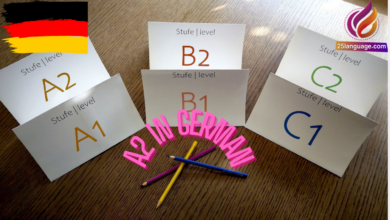Imperative (Command Form )in German
German Imperative Forms

German imperative forms.
Pass the spoon please! Be quiet! Call me if you need anything! There are number of situations in our daily routine where we use imperative expressions. So, learning German imperative is equally important.
You all must be wondering, what exactly are German imperative forms or when and how to use them? Don’t worry! This lesson will answer all your questions. Let’s get started!
German Imperative
German imperative is used when you want to give commands, orders, advice or instructions. It it also used to express requests. For instance, when you want someone to do something, you say – Do it! (Mach das!)
In the process of giving orders or instructions to get something done, you might sound arrogant to some people. Use the word please (bitte) to sound polite. For example, Please send the report by 5 pm! (Sende bitte den Bericht bis 17 Uhr!)
On the contrary, imperative expressions are needed to respond to rudeness and sound aggressive. In addition to this, German imperative is also used if you want to encourage someone.
Giving instructions in your native language is extremely easy. Consider English! It has only one form of address, which is “you”. Thus, there is only one imperative form in English.
However, there are three forms of address in German – du, ihr and Sie. Building German imperative phrases may seem a little difficult and tricky at first. But with regular practice, you’ll ace it too!
German Imperative Sentences
Just like three forms of address, there are 3 forms of imperative for “you” in German. This section will cover how to conjugate the imperative forms of German verbs. Before learning conjugations, the most important things to remember are:-
- Imperative sentences always begin with the verb (present tense).
- There is an exclamation mark at the end of the sentence.
- Similar to other tenses, the prefix of the separable verb goes at the end of the imperative sentence.
- Building a sentence with negation means telling someone what not to do. In such cases, simply add the word “nicht” after the verb.
The imperative of modal verbs does not exist.
German imperative forms are used in formal as well as informal scenarios. “Sie” is used in formal situations and “du” or “ihr” are used in informal situations. Apart from these three, there is another form of address – Wir (We).
Now, let’s study these 4 forms in detail.
Imperative | German for beginners
Sie – Second Person Singular or Plural
Sie imperative form (formal) is the only form where the personal pronoun appears in the sentence. It takes second position in the sentence, i.e comes after the verb.
The imperative for Sie is formed with the verb in the infinitive form + Sie.
Here are a few examples for you:-
| English | German |
| Please deliver the letters soon! | Tragen Sie bitte die Briefe bald aus! |
| Throw the ball here! | Werfen Sie den Ball hierher! |
| Give me a spoon! | Geben Sie mir einen Löffel! |
| Please try this watermelon! | Probieren Sie bitte diese Wassermelone! |
| Don’t drink so much coffee! | Trinken Sie nicht so viel Kaffee! |
Ihr – Second Person Plural
Ihr imperative form (informal) stays the same as its present tense form. That means, verb stem + t. However, the pronoun ihr is dropped.
Here are a few examples for you:-
| English | German |
| Note down his address! | Notiert seine Adresse! |
| Swim at least twice a week! | Schwimmt mindestens zweimal wöchentlich! |
| Please sprinkle the salt! | Bestreut bitte das Salz! |
| Repair the computer till evening! | Repariert den Computer bis zum Abend! |
| Pack the suitcase today! | Packt den Koffer heute! |
Du – Second Person Singular
Du imperative form (informal) is a bit tricky, because there are some exceptions. It is formed by removing the ending -st from the verb stem. The pronoun du is also dropped.
The du imperative forms of regular or weak verbs are simple. Gehen becomes Geh, Lernen becomes Lern and so on.
However, it’s not so easy for irregular verbs. As mentioned earlier, you need to watch out for exceptions. They are as follows:-
- Any vowel changes in the stem of the strong verbs also occur in their imperative forms. For instance, nehmen – nimm, lesen – lies etc.
- If the vowel change is from a to ä (adding an umlaut), then it does not occur in the imperative. For instance, du fährst – Fahr.
- If the verb stem ends in -d or -t, then we add an -e after the stem. For example, arbeiten – arbeite, senden – sende etc.
- If the verb stem ends in -tm, -fn, -dn or -chn, even then we add an -e after the stem. For example, atmen – atme, zeichnen – zeichne etc.
- Verbs ending in -eln or -ern also have an additional -e at the end of the stem. But, the -e in the verb stem is often omitted in spoken German. For instance, sammeln – samm(e)le, feiern – fei(e)re etc.
Here are a few sentences for you:-
| English | German |
| Please wait for me! | Warte bitte auf mich! |
| Give me the fork! | Gib mir die Gabel! |
| Pick up your aunt from the train station! | Hol deine Tante vom Bahnhof ab! |
| Turn off the TV! | Schalte den Fernseher aus! |
| Run for half an hour every day! | Lauf täglich eine halbe Stunde! |
These 3 are the most commonly used forms. But, there is one more German imperative form for the first person plural – wir.
Wir – First Person Plural
Wir imperative form is used when you want to address a group including yourself. It is formed with verb in the infinitive form + wir. This form is equivalent to English sentences beginning with “Let’s. . . “.
For example, Gehen wir! (Let’s go!)
This is the simplest way to build a wir – imperative statement. However, native German speakers prefer to use the verb lassen (to let / to leave). So, if you want to sound like a native, say the same sentence this way-
Lass uns gehen! (Let’s go!) The action verb is always in infinitive form and goes at the end. The statement always starts with “Lass uns“.
Uns is the accusative form of wir. Check out our lesson on Pronouns to know more.
| English | German |
| Let’s drive to Berlin! | Lass uns nach Berlin fahren! |
| Let’s speak in German! | Lass uns auf Deutsch sprechen! |
| Let’s order a Pizza! | Lass uns eine Pizza bestellen! |
Imperative of German Helping Verbs
The German imperative forms of auxiliary or helping verbs sein, haben and werden are irregular. The du – forms of all the 3 verbs and the Sie – form of sein are different.
| Du | Ihr | Sie | |
| Sein | Sei | Seid | Seien |
| Haben | Hab | Habt | Haben |
| Werden | Werde | Werdet | Werden |
For instance, Sei ehrlich! (Be honest!) or Werde nicht böse! (Don’t get angry!)





























